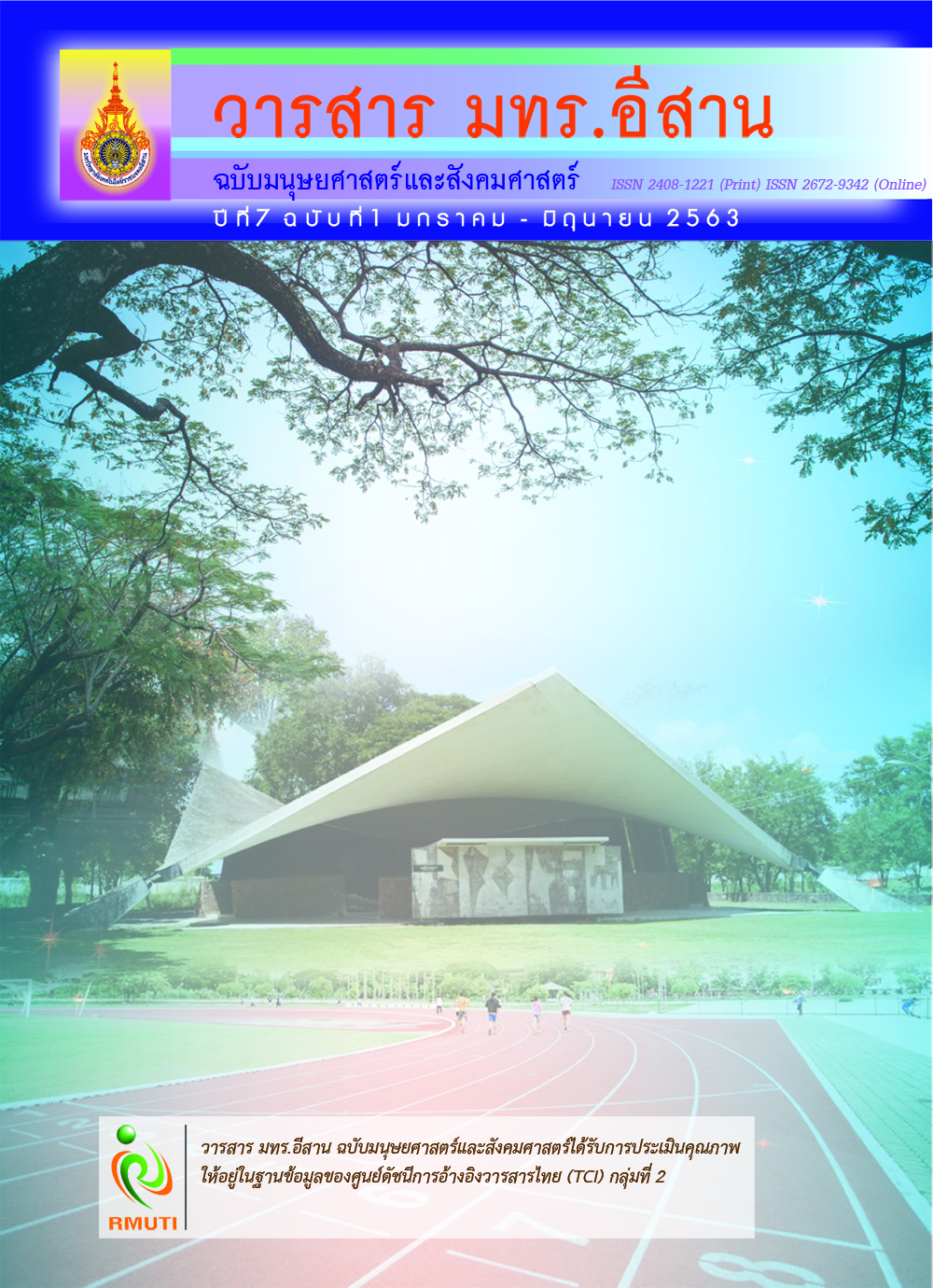Research and Community-Based Learning for Social Service Research Awareness in Higher Education
Main Article Content
Abstract
The objectives of this article are to provide an understanding of instructional in higher education. The learning outcomes expect of graduates at least 5 area as follows: ethics and moral, knowledge, cognitive skill, interpersonal skills and responsibility, and numerical analysis, communication and information technology. To be the guideline for choosing appropriate instructional techniques to develop students. Including promoting desirable features that help learners prepare for changes in the world, promote citizenship and considering the part of society. In this article presenting guideline of research and community-based learning, that integrated research - based learning and community - based learning. Research and community-based learning is an alternative instructional for students in higher education to practice, conduct research for solving problems within the community. The students and community have collaborated to create a joint research project, to use the research results to be useful in the community, and learners are aware of the social service research consists of 5 steps: 1) prepare to learn content from research, 2) learning strategies to use learning techniques with research process and use the problems based from the community, 3) conduct research, 4) reflections through experiences that affect emotions and feelings of research awareness, and 5) evaluate learning results. By this approach, focusing on the development of the affective domain allowing students to get to know the community through a research process that analyzes community needs that can help solve problems for the community by applying knowledge in the classroom to apply. Students and communities benefit from the activities that are mutually beneficial. Learners see the importance, responsibility, and consequences will result in students following 5 area of Thai Qualification Framework for Higher Education. As a result, learners become 5 stages of research awareness are 1) research reception, 2) research responding, 3) research value, 4) research value management system, and 5) research creating traits.
Article Details
บทความที่ได้รับการตีพิมพ์เป็นลิขสิทธิ์ของมหาวิทยาลัยเทคโนโลยีราชมงคลอีสาน
ข้อความที่ปรากฏในบทความแต่ละเรื่องในวารสารวิชาการเล่มนี้เป็นความคิดเห็นส่วนตัวของผู้เขียนแต่ละท่านไม่เกี่ยวข้องกับมหาวิทยาลัยเทคโนโลยีราชมงคลอีสานและคณาจารย์ท่านอื่นๆในมหาวิทยาลัยฯ แต่อย่างใด ความรับผิดชอบองค์ประกอบทั้งหมดของบทความแต่ละเรื่องเป็นของผู้เขียนแต่ละท่าน หากมีความผิดพลาดใดๆ ผู้เขียนแต่ละท่านจะรับผิดชอบบทความของตนเองแต่ผู้เดียว
References
กรนภา วัชระธำรงกุล. (2552). การสร้างแบบวัดความตระหนักรู้ต่อผลกระทบของสภาวะโลกร้อนสำหรับนักเรียนช่วงชั้นที่ 4 สังกัดสำนักงานเขตพื้นที่การศึกษา กรุงเทพมหานคร เขต 1. กรุงเทพฯ: การศึกษามหาบัณฑิต สาขาวิชาการวัดผลการศึกษา มหาวิทยาลัยศรีนครินทรวิโรฒ
ฐิติยา เนตรวงษ์, ละมัย ร่มเย็น และพัทธนันท์ ชุมภูนุช. (2561). สะเต็มในระดับอุดมศึกษาเพื่อพัฒนาการเรียนรู้ในศตวรรษที่ 21. วารสารวิชาการครุศาสตร์อุตสาหกรรม พระจอมเกล้าพระนครเหนือ. ปีที่ 9, ฉบับที่ 3, หน้า 296-302
ทิศนา แขมมณี. (2562). ศาสตร์การสอน องค์ความรู้เพื่อการจัดกระบวนการเรียนรู้ที่มีประสิทธิภาพ. พิมพ์ครั้งที่ 23. กรุงเทพฯ: สำนักพิมพ์แห่งจุฬาลงกรณ์มหาวิทยาลัย
บรรพต พิจิตรกำเนิด, ฐิติยา เนตรวงษ์, นันทวัน เรืองอร่าม, ปาณิศรา ธรรมจุฒา และภัควลัญช์ อุ้มบุญ. (2562). การพัฒนาความตระหนักรู้การวิจัยของนักศึกษาสาขาวิชาบรรณารักษศาสตร์และสารสนเทศศาสตร์ โดยใช้การจัดการเรียนรู้ด้วยการวิจัยและชุมชนเป็นฐาน. กรุงเทพฯ: มหาวิทยาลัยสวนดุสิต
พวงผกา ปวีณบำเพ็ญ. (2560). การจัดการเรียนรู้โดยใช้วิจัยเป็นฐาน. ศึกษาศาสตร์สาร มหาวิทยาลัยเชียงใหม่. ปีที่ 1, ฉบับที่ 2, หน้า 62-71
พิมพันธ์ เดชะคุปต์ และพเยาว์ ยินดีสุข. (2558). การจัดการเรียนรู้ในศตวรรษที่ 21. พิมพ์ครั้งที่ 2. กรุงเทพฯ: โรงพิมพ์แห่งจุฬาลงกรณ์มหาวิทยาลัย
ไพฑูรย์ สินลารัตน์. (2555). หลักและเทคนิคการสอนระดับอุดมศึกษา. กรุงเทพฯ: มหาวิทยาลัยธุรกิจบัณฑิตย์
ศศิธร บัวทอง. (2549). ผลของการใช้กิจกรรมกระบวนการการใช้เหตุผลเชิงจริยธรรมประกอบสื่อสิ่งพิมพ์ที่มีต่อความตระหนักในปัญหาค่านิยมฟุ้งเฟ้อของนักเรียนชั้นมัธยมศึกษาปีที่ 2. กรุงเทพฯ: ปริญญานิพนธ์การศึกษามหาบัณฑิต สาขาวิชาการวิจัยและสถิติทางการศึกษา) มหาวิทยาลัยศรีนครินทรวิโรฒ
ศรีวรรณ ฉัตรสุริยวงศ์. (2557). กระบวนทัศน์การจัดการเรียนรู้โดยใช้ชุมชนเป็นฐาน เพื่อส่งเสริมความสามารถด้านการคิดอย่างมีวิจารณญาณและการแก้ปัญหาเชิงสร้างสรรค์ สำหรับนักเรียนระดับประถมศึกษา. กรุงเทพฯ: วิทยานิพนธ์ปริญญาปรัชญาดุษฎีบัณฑิต สาขาวิชาหลักสูตรและการสอน มหาวิทยาลัยศิลปากร
สินธะวา คามดิษฐ์. (2557). การจัดการเรียนการสอนโดยใช้กระบวนการวิจัยในระดับอุดมศึกษา. สุทธิปริทัศน์. ปีที่ 28, ฉบับที่ 85, หน้า 9-21
สำนักงานคณะกรรมการการอุดมศึกษา. (2560). แนวทางการปฏิบัติตามกรอบมาตรฐานคุณวุฒิระดับอุดมศึกษาแห่งชาติ พ.ศ. ๒๕๕๒. เข้าถึงเมื่อ (20 มีนาคม 2560). เข้าถึงได้จาก (http://www.mua.go.th/users/tqf-hed/)
สำนักงานเลขาธิการสภาการศึกษา. (2552). ข้อเสนอการปฏิรูปการศึกษาในทศวรรษที่สอง (พ.ศ. 2552 - 2561). กรุงเทพฯ: พริกหวานกราฟฟิค
สำนักงานสภานโยบายการอุดมศึกษา วิทยาศาสตร์ วิจัยและนวัตกรรมแห่งชาติ และสำนักงานคณะกรรมการส่งเสริมวิทยาศาสตร์ วิจัยและนวัตกรรม. (2562). นโยบายและยุทธศาสตร์การอุดมศึกษา วิทยาศาสตร์ วิจัยและนวัตกรรม พ.ศ. ๒๕๖๓ - ๒๕๗๐ และแผนด้านวิทยาศาสตร์ วิจัยและนวัตกรรม พ.ศ. ๒๕๖๓ - ๒๕๖๕. กรุงเทพฯ: กระทรวงการอุดมศึกษา วิทยาศาสตร์ วิจัย และนวัตกรรม
Bloom, B. S., Hasting, T. J., and Madaus, G. F. (1971). Handbook on Formative and Summative Evaluation of Student Learning. New York: McGraw-Hill Book
Mcllrath, L. and McDonnell, C. (2018). Community-Based Learning. Access (7 July 2018). Available (http://www.campusengage.ie/userfi les/fi les/Community-Based%20Learning%20WEB.pdf)


